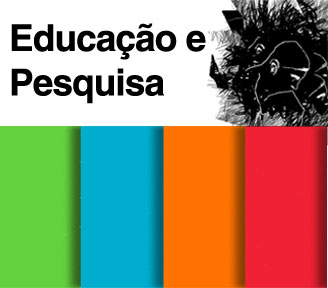Pedagogical practices and teacher autonomy in the context of elite bilingual education
DOI:
https://doi.org/10.1590/S1678-4634202248246542porKeywords:
Pedagogical practices, Teacher autonomy, Elite bilingual education, Teacher work and trainingAbstract
In this article, some answers are suggested about how the autonomy of teachers in an elite bilingual context is perceived in their voices, through analyzes of what they say about their pedagogical practices. The problem that gave rise to the research fell on the varied higher education of teachers who were not trained to work with levels of early childhood education and early grades; in some cases, they did not even have a licentiate degree. This “space” between initial training and pedagogical practices shed light on issues concerning teacher autonomy. The methodological approach was recommended by qualitative research, using a written questionnaire and a discussion group as instruments for data generation. The reflections were based on the following authors: García (2009), Benson (1997), Benson and Huang (2008), Cunha (2007), Pesce (2012), Tardif (2002) and Megale (2020). We understand that, although teachers do not recognize autonomy in their practices, nor use this word in their speeches, it is through the choices they make to mobilize the teaching and learning process that they exercise their protagonism and empower themselves in the exercise of the profession. It is concluded that what evidences their autonomy seems to be the decisions they make to adapt their practices to what the management of school expects, to what the Guidance Manuals indicate, and to what the teacher’s book predicts,
while looking for a practice that proves to be effective, even in the absence of the control
imposed by the institution.
Downloads
References
BAKER, Collin. Foundations of bilingual education and bilingualism. 3. ed. Clevedon: Multilingual Matters, 2001.
BENSON, Phil. The philosophy and politics of learner autonomy. In: BENSON, Phil; VOLLER, Peter (ed.). Autonomy and independence in language learning. London: Longman, 1997. p. 18-34.
BENSON, Phil; HUANG, Jing. Autonomy in the transition from foreign language learning to foreign language teaching. Delta, São Paulo, v. 24, n. 3, p. 421-439, 2008. Disponível em: https://booksc.xyz/book/73134506/eba448 Acesso em: 7 jun. 2020.
» https://booksc.xyz/book/73134506/eba448
CAVALCANTI, Marilda do Couto. Estudos sobre educação bilíngue e escolarização em contextos de minorias linguísticas no Brasil. Delta, São Paulo, v. 15, n. 3, p. 385-417, 1999.
CUNHA, Maria Isabel da. O bom professor e sua prática. 19. ed. São Paulo: Papirus, 2007.
GARCÍA, Ofelia. Bilingual education in the 21st century: a global perspective. Oxford: Wiley-Blackwell, 2009.
GATTI, Bernadete; ANDRÉ, Marli. A relevância dos métodos de pesquisa qualitativa em educação no Brasil. In: WELLER, Wivian; PFAFF, Nicolle (org.). Metodologias da pesquisa qualitativa em educação. Petrópolis: Vozes, 2010, p. 29-38.
GERALDI, João Wanderley. Notas sobre a autonomia relativa do professor e seu cerceamento constante. Revista do Nesef, Curitiba, v. 5, n. 1, p. 116-138, 2016.
GIMENO SACRISTÁN, José. O currículo: uma reflexão sobre a prática. Tradução Ernani F. da Fonseca Rosa. 3. ed. Porto Alegre: Artmed, 2000.
KUMARAVADIVELU, Bala. The postmethod condition: (E)merging strategies for second/foreign language teaching. Tesol Quarterly, Alexandria, v. 28, n. 1, p. 27-48, 1994.
LÜDKE, Menga (coord.). O que conta como pesquisa? São Paulo: Cortez, 2009.
MANUAL de orientação 01: programa bilíngue. [S. l.: s. n., 201-].
MANUAL de orientação 03: programa bilíngue. [S. l.: s. n., 201-].
MARCELINO, Marcello. Bilinguismo no Brasil: significado e expectativas. Intercâmbio, São Paulo, v. 19, p. 1-22, 2009. Disponível em: https://revistas.pucsp.br/intercambio/article/viewFile/3487/2295 Acesso em: 22 abr. 2019.
» https://revistas.pucsp.br/intercambio/article/viewFile/3487/2295
MARTINS, Angela Maria. Autonomia e educação: a trajetória de um conceito. Cadernos de Pesquisa, São Paulo, n. 115, p. 207-232, 2002.
MEGALE, Antonieta (org.). Desafios e práticas na educação bilíngue. São Paulo: Fundação Santillana, 2020.
MEGALE, Antonieta; LIBERALI, Fernanda. Caminhos da educação bilíngue no Brasil: perspectivas da linguística aplicada. Raído, Dourados, v. 10, n. 23, p. 9-24, 2016.
PESCE, Marly Krüger de. A formação do professor pesquisador nos cursos de licenciatura: a perspectiva do professor formador e dos licenciandos. 2012. Tese (Doutorado em Educação) – Pontifícia Universidade Católica de São Paulo, São Paulo, 2012.
PINHEIRO, Petrilson Alan. A era do “multissinóptico”: que (novos) letramentos estão em jogo? Educação em Revista, Belo Horizonte, v. 30, n. 2, p. 137-160, 2014.
ROCHA, Cláudia Hilsdorf. Educação linguística na liquidez da sociedade do cansaço: o potencial decolonial da perspectiva translíngue. Delta, São Paulo, v. 35, n. 4, p. 1-39, 2019.
SILVA, Vanessa Cristina da; DAVIS, Claudia Leme Ferreira. Contribuições metodológicas para a análise dos sentidos em um estudo sobre atividade docente. Educação e Pesquisa, São Paulo, v. 42, n. 1, p. 39-51, 2016.
TARDIF, Maurice. Saberes docentes e formação profissional. 5. ed. Petrópolis: Vozes, 2002.
TRIVIÑOS, Augusto Nibaldo Silva. Introdução à pesquisa em ciências sociais: a pesquisa qualitativa em educação. São Paulo: Atlas, 1987.
VERTOVEC, Steven. Super-diversity and its implications. Ethnic and Racial Studies, Abingdon, v. 30, n. 6, p. 1024-1054, 2007.
VIGOTSKI, Liev Semionovich. Psicologia pedagógica. Tradução Claudia Schilling. Porto Alegre: Artmed, 2003.
WELLER, Wivian. Grupos de discussão na pesquisa com adolescentes e jovens: aportes teórico-metodológicos e análise de uma experiência com o método. Educação e Pesquisa, São Paulo, v. 32, n. 2, p. 241-260, 2006.
Downloads
Published
Issue
Section
License
Copyright (c) 2022 Educação e Pesquisa

This work is licensed under a Creative Commons Attribution-NonCommercial 4.0 International License.
Authors assume exclusive responsibility for the concepts expressed in their articles, which do not necessarily reflect the journal’s opinion.
Permission to photocopy all or part of the material published in the journal is granted provided that the original source of publication be assigned.



